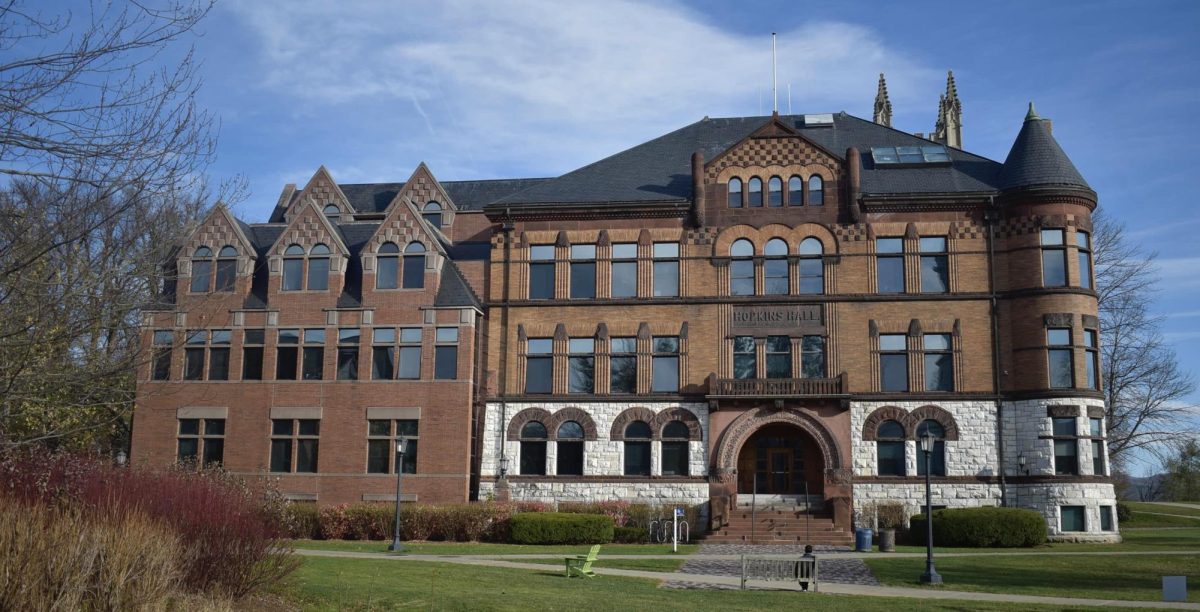Chaplains’ Corner: Giving space for pain’s reverberations
October 27, 2021
Each morning before I leave for work, I take my dogs Ruby and Birch for a walk in the field behind our house. We’re fortunate to have some space, and I usually let them go off-leash for about 15 minutes to do their business before calling them back.
While Birch always comes back when I call, Ruby is a bit more stubborn. Half the time when I call her, she ignores me.
When Ruby disappears, I usually call in a loud voice, “Ruuuuubbbyyyyyyyy.” Typically, nothing happens. Ruby doesn’t come back. But the sound of my call returns as an echo, especially the last part: “bbbbbyyyyyyyyyy.” I’ll call out again, and then I’ll again hear the end of my call return to me: “bbbbbyyyyyyyyyy.”
What is an echo, and what does it mean? While faculty in the physics department will rightly tell us that echoes are sound waves that bounce off of objects and back to- ward us, I think that echoes are intriguing phenomena, mysterious occurrences that raise foundational questions if we pause to reflect on them: What does it mean for sound to bounce back to us? Is there any meaning to that returning sound, and does that meaning differ from the sound that gives rise to the echo?
In other words, what sense do we make of the echoes in the world?
In one section of the Zohar (3:168b-169a), the 13th- century masterpiece of Jewish mysticism, the central character, Rabbi Shimon bar Yochai, asks questions about echoes. He is being given a tour of heavenly realms by spirit guides, and he wants to know why sometimes, a person calls out and the sound returns. He wants to know what echoes are, and if they mean anything.
The guides respond with a fantastical answer. They say that there are different kinds of sounds, and when some of them appear, they are never lost. Words of study and words of prayer are one type of everlasting speech. According to the spirit guides, they ascend through the heavens.
But not all sound behaves this way. Sounds of pain fall into cracks in rocks, in caves, and into the ground. These cries of pain — of birth, of death, and of transition — saturate the natural world. They remain in the ground until they are awakened by the call of a person. That sound then awakens the cries of pain that are hidden in the natural world, and they awaken and manifest as an echo.
The problem is, most of us ignore these sounds. The remnants of pain remain buried, unaccessed. For even when we hear an echo, we often pay it no heed or are ignorant of the pain it conveys.
When we hear an echo, we do not necessarily hear our voice. Rather, an echo is the cry of pain that accompanies birth and death. There is a sort of pain that arises in both of these transitional moments in life, and that pain does not go away. Most of us are oblivious to these cries, or we try to forget about them. After all, they are unpleasant and painful. We might not want to recall the death of people that we know or care about. But they are moments that continue to exist. And we can tap into them. Moreover, the Zohar seems to suggest, we should listen to them, and make room for them.
The spirit guides go on to explain that there are individuals in this world who know how to identify and bear witness to this pain: witches and wizards. They bend down, get close to the ground, and listen for these sounds. In the medieval European context in which the Zohar appeared, witches and wizards were not always the most trustworthy figures. In fact, they are often associated with black magic. There is something suspicious about the fact that they seek out cries of pain buried in the cracks of the earth, and a fear that they will use them for nefarious purposes. And yet, the possibility of bending down and listening carefully to cries of pain strikes me as remarkable and beautiful.
So many of us walk through the world, holding onto a lot of pain in our subconscious. We stay on the surface of our awareness most of the time, and we are driven about by forces that we’re not fully aware of. They drive us crazy because they want to be heard but are not. In a similar way, echoes wander in the world, try to be heard, but are often neglected. Yet there are individuals who know that echoes want to be heard and have something to say. The witches and wizards who pay attention do something vital when they engage in a practice that involves bending down and listening. They create an opening for the echoes to be heard.
I think these are important lessons for us. Despite appearances, there are cries of suffering all around us: in the earth, in the souls of those around us and in our circles, and in ourselves. We need not overwhelm ourselves by listening to all of them, all of the time. But it can be vital and life-giving to open our ears to some of them from time to time. To turn our gaze downward and inward, to see what arises from the ground, to notice the suffering, and to bear witness to it. To give space to the pain in the world that so desperately wants to be seen. We might not be able to make it go away or resolve it, but the sounds of the world arise as echoes that seek to be heard. Perhaps by listening to the pain we encounter, we might give it a bit of a respite.
Rabbi Seth Wax is the College’s Jewish chaplain.







